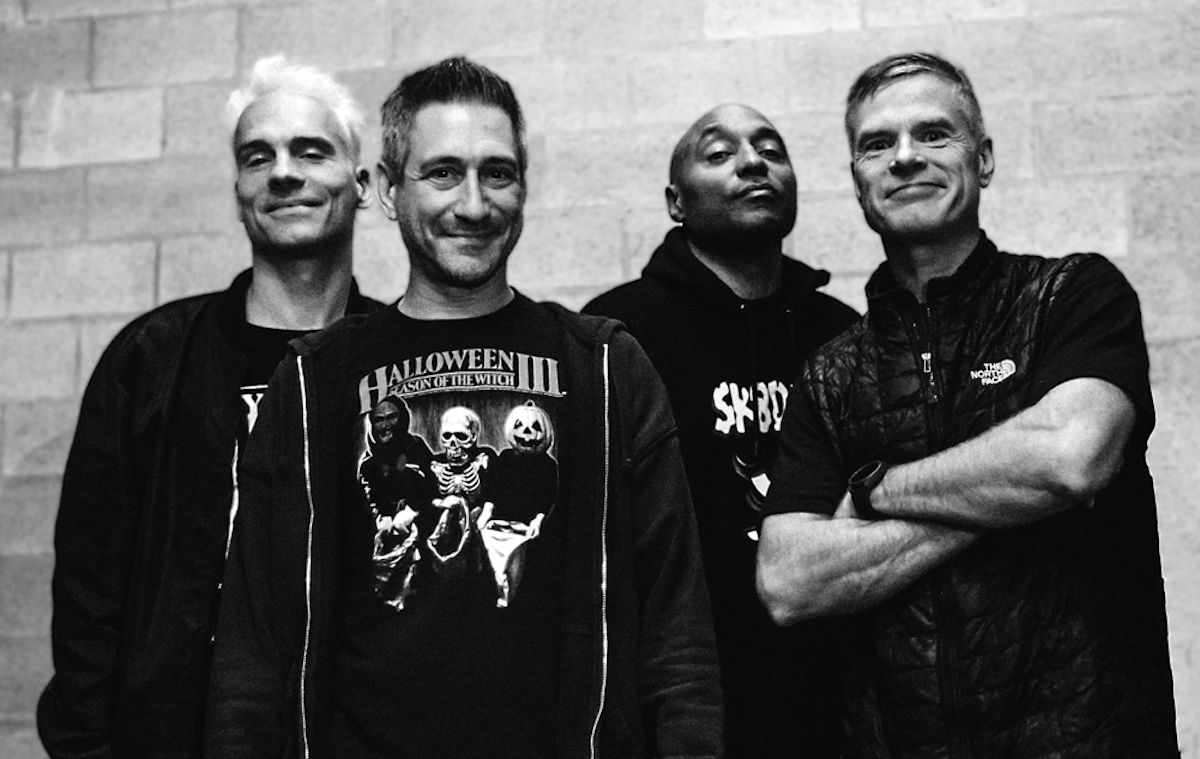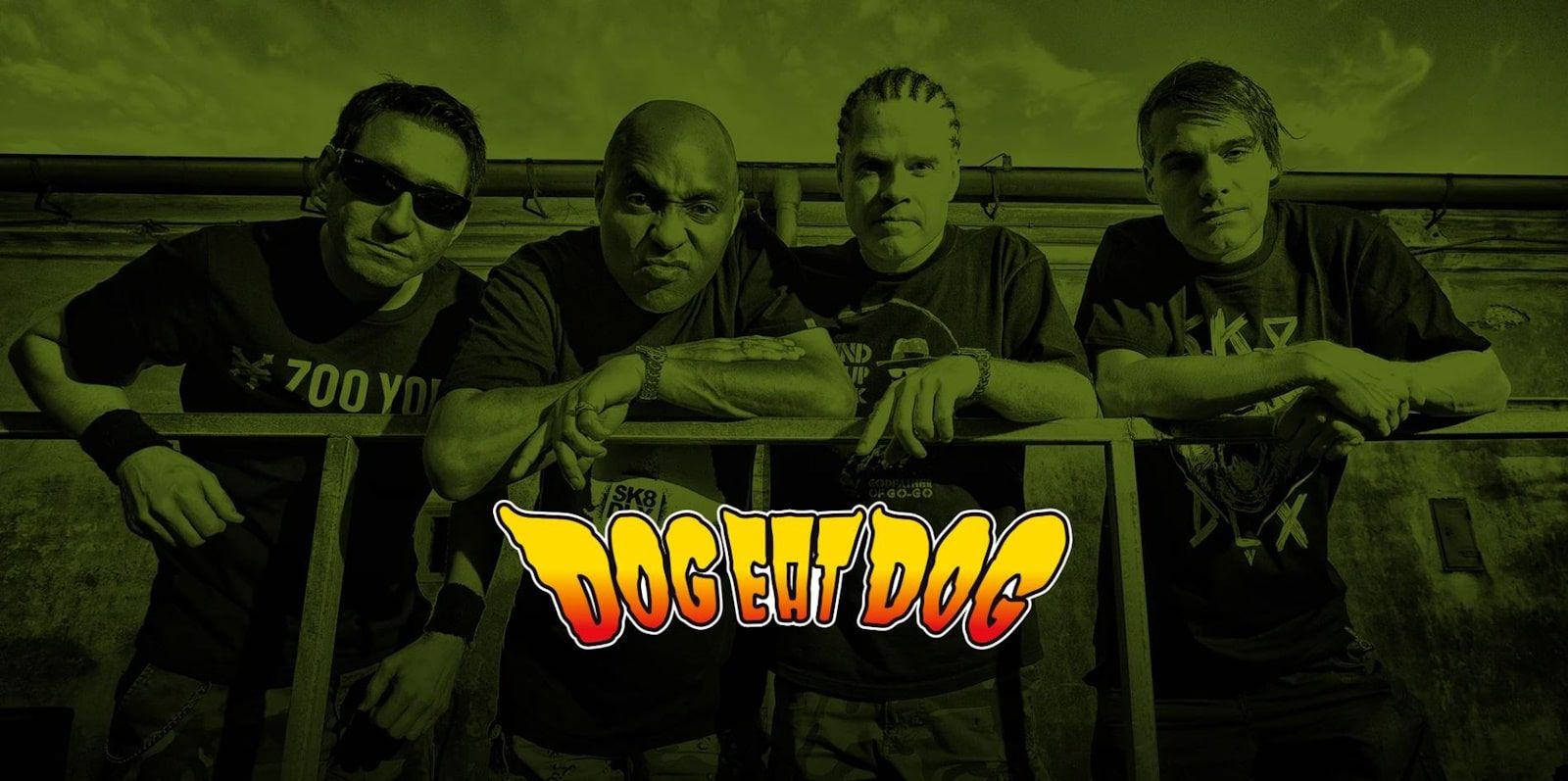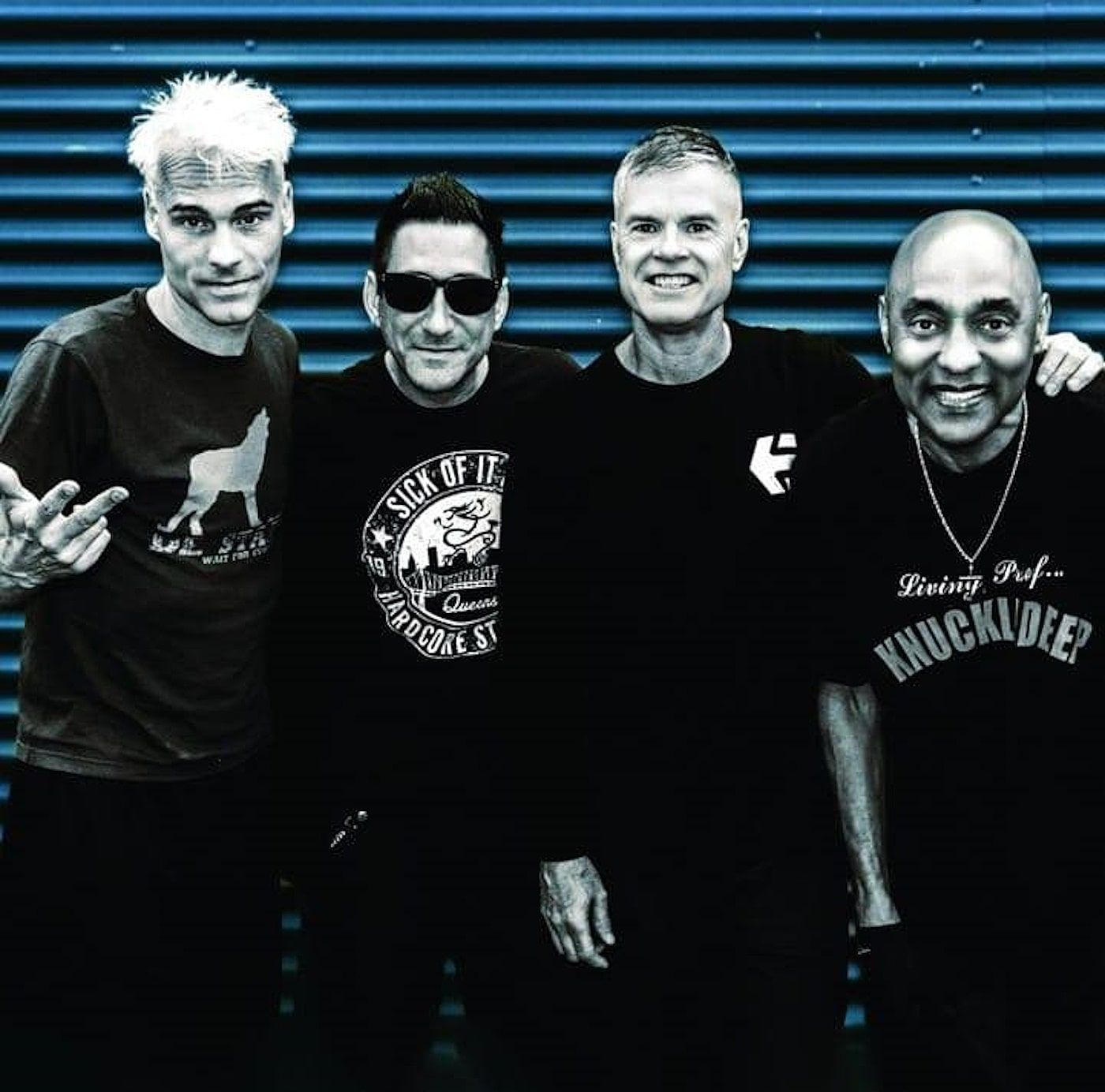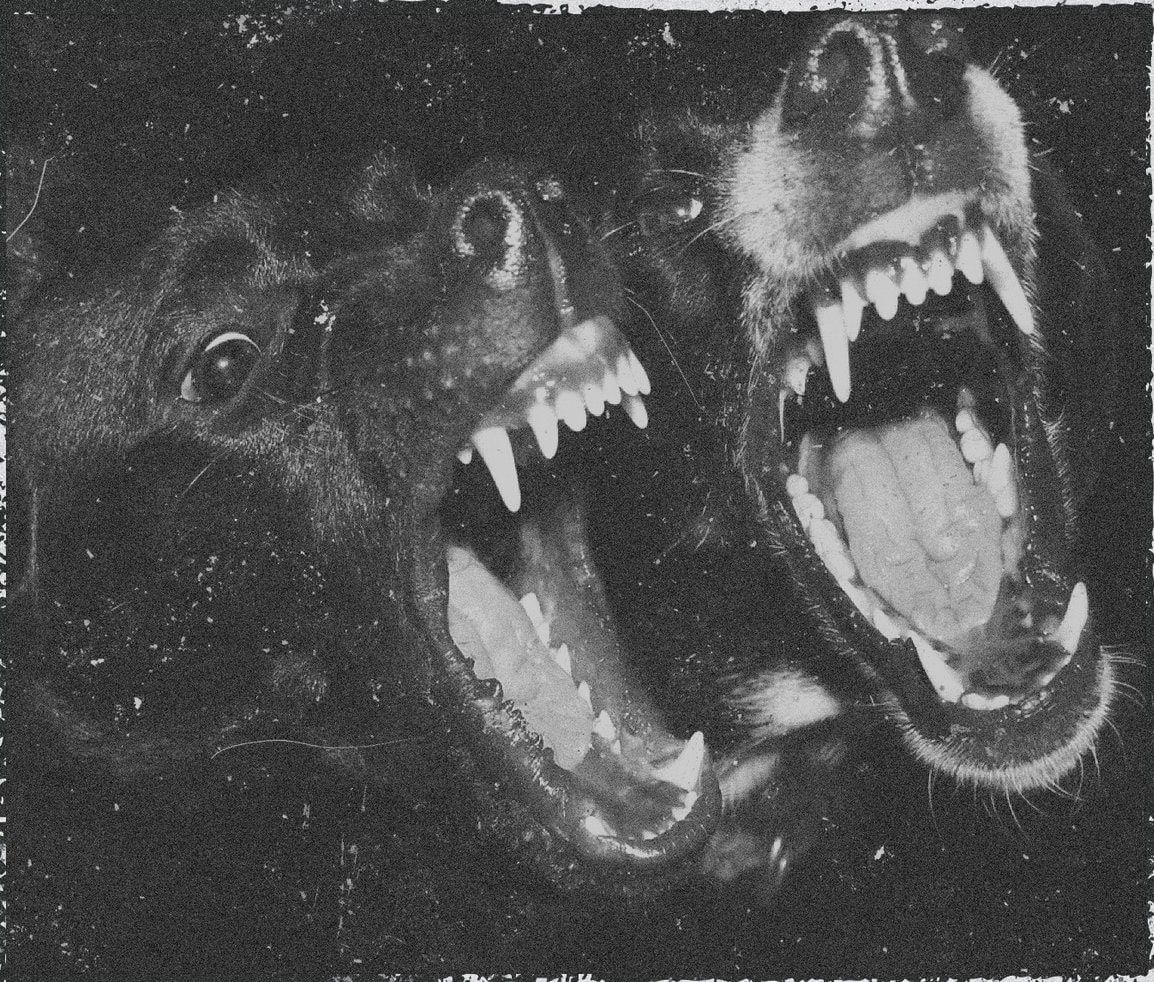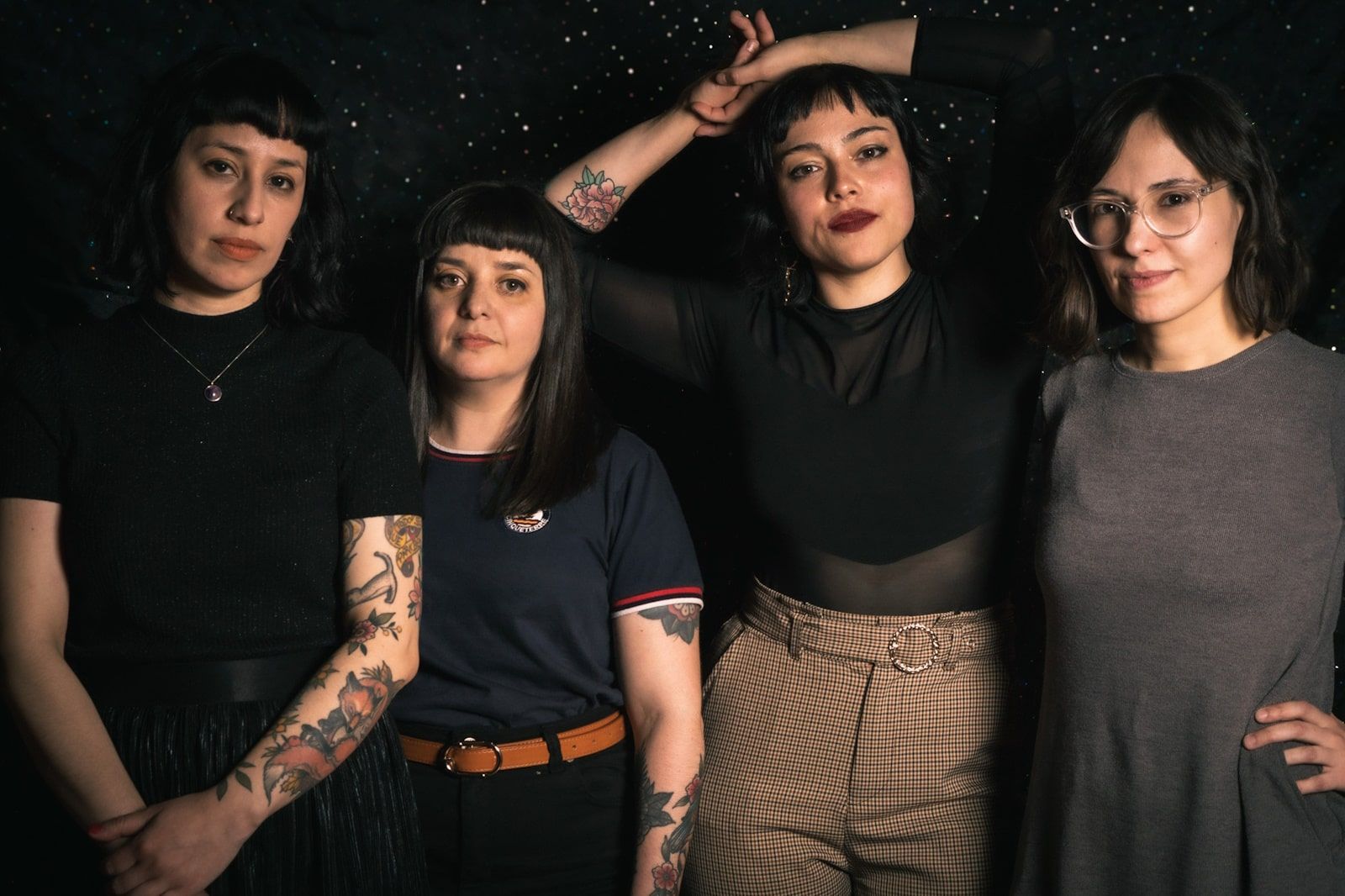Amidst the rhythmic chaos and relentless energy of the punk scene, few bands have managed to carve out as distinct and evolutionary a niche as Dog Eat Dog. Fusing diverse elements from hardcore punk to ska and introducing the world to a unique blend of musical styles, the New Jersey band’s journey has been as unpredictable as their sound.
Their recent single, “Man’s Best Friend,” released on September 15th, reminds fans old and new of their prowess in genre-blending. A part of their upcoming album, ‘Free Radicals,’ the track resonates with anthemic choruses and, notably, one of the “funkiest saxophone lines since ‘No Fronts’” — their own words, evoking nostalgia from the band’s heyday.
As we sat down with JC, the iconic voice leading the band, he regaled us with tales from their inception—vivid memories of raw performances in the pulsing heart of NYC, the thrill of fresh beginnings, and friendships blending to create something more significant than music itself. The band found their rhythm, quite literally, by refusing to be boxed into a single genre, dancing instead to the beat of their own drum. And what a dance it has been!
From the humbling experience of warming the stage for the legendary Bad Brains in the UK, to having their anthems play on MTV reaching corners of the world they once only dreamt of, their journey has been nothing short of a rollercoaster. And while the digital age might have transformed the way music resonates in our ears, for this band, the authentic thrum of live shows remains their true north.
As the music world counts down to the unveiling of ‘Free Radicals‘ this October 20th, whispers of their scheduled European performances are creating a buzz. So, for those yearning for a fun evening that promises nostalgia, exhilaration, and pure unadulterated passion, be sure not to miss the band’s upcoming European tour this autumn.
Dive deep into their story and the list of gigs in our detailed interview below.
Hey there guys, thanks so much for sharing your time with us here on IDIOTEQ. Let’s start off with a brief look back at your career. How do you recall your early days? Take us back to the early days when you were playing birthday parties and fraternity houses. What were some of the most memorable moments and most memorable gigs from that era?
Hi, you are very welcome. We appreciate you taking interest in us and Free Radicals.
The early days were a lot of fun. Creating something new has a great energy to it always. We were lucky because we had a large friend group that supported us and that helped us get off the ground quickly and grow fast.
Because we could draw well, we got a reputation in our local regions as a band that had a following. We had epic shows in the early days at places like “Pipeline” and “Studio 1” in NJ and “Bond St. Cafe” in NYC.
Starting out in New Jersey, how did the local scene there influence your initial sound?
Being so close to NYC, we had access to so much great live music and incredible diversity that helped open our minds to lots of styles. Plus, when we started we made a decision to not place genre boundaries on what we were creating. Our local scene had a big influence on what we were exposed to musically. There were also opportunities to play live because of the abundance of venues to play.
Being one of the pioneers in blending hardcore punk and rap into what is now termed ‘crossover,’ did you face any resistance or skepticism initially?
Not really. Our sound came together organically. The resistance and skepticism came later from “music industry executives” not music fans or listeners who just want to “feel” something and don’t always want to explain or categorize what they are feeling or listening to.
Can you recall that moment when you realized that Dog Eat Dog had the potential to go beyond local fame? Was there a specific event or gig that made it clear?
Because Dave and Sean came from Mucky Pup and had toured in Europe before, we had a notion that we could achieve that as well. I guess for me, getting an opportunity to open for Bad Brains in the UK (1993) was my first “wow” moment.
You’ve had a longstanding relationship with MTV since the early days. How did that partnership come to be, and in what ways did it propel your career?
In ’94 when we joined Biohazard on their EU tour we had the “No Fronts” video clip ready to go.
Luckily our position on the tour gave us an opportunity to be added to specialty shows like Headbangers Ball and 120 Minutes on MTV. From there, it was the viewers who took over and just kept requesting and supporting us. The MTV success was critical to exposing us to a global audience. It opened doors to South East Asia and Japan, Israel, Brazil. I don’t think that would have occurred without MTV.
Your debut album “All Boro Kings” was a game-changer with hits like “No Fronts” and “Who’s The King.” How did it feel to have created something that would leave a lasting imprint on the crossover genre?
It’s always nice to be seen and recognized for doing something that people enjoy. We are proud to know that our music impacted people for such a long period of time.
The lineup has seen various changes but has been consistent since 2009. Can you tell us about that evolution? How on Earth did you manage to stick together, and how has this stability affected your creative process?
I guess for a band that has lasted 33 years, change is inevitable. Part of the ability to stay together, especially in down times, is that we don’t rely on the band to be our primary income. That allows our decision making to not be heavily influenced by financial pressure and that affects the creative process and everything else we have to decide on. It is a different mindset.
A bi-continental lineup must come with its set of challenges and benefits. How has it influenced your sound and team dynamics?
It’s what is normal to us. Again, we never were compelled to follow rules so that bleeds into our lineup. Having a Czech sax player and a Swiss guitarist gives us a global footprint and also gives us a deeper understanding of people around the world. There is no way that can be seen as anything but a positive thing.
Throughout your journey, what has been the most unexpected turn or event that you could have never predicted when you first formed the band?
Longevity.
In the days before the internet and social media, word of mouth and live performances were crucial. How did you manage to break through the noise back then?
Dave, Sean, and myself plus whoever else was in the lineup had social circles outside the band. Whether from work, skateboarding or whatever.
That meant when we played shows, different groups of friends mixed and became friends. As I mentioned, this gave us quick clout in our local clubs. Plus we had a vibe and sound that differentiated us from other bands.
What good old marketing strategies would you consider still valid for a rock band in 2023?
Playing live in front of people. Get on festivals.
Is there something new in the “Free Radicals” promotional game?
That is hard to say because the album is not out yet. But one thing that sticks out is we had 4 singles come out before the album. Back in the 90s we had a first single and then it was “let’s see what happens when the album drops” strategy.
Your early experiences were firmly planted in the era of analog—tape demos, physical flyers, and so on. How does the tangible feel of those early days compare to the digital interactions of today’s music scene?
You can’t compare. There are so many options for entertainment and distraction in the world today that music isn’t as important to people as it used to be, in my opinion. The way it’s consumed is certainly more disposable than when we started.
Your music has always had an element of social commentary. How has your perspective on the issues you tackle evolved over the years, and do you think punk rock still plays a role in how those messages are received? How do you approach this on “Free Radicals”?
We have always tried to be honest and entertaining at the same time. “Free Radicals” certainly has commentary on life. Our age has led to life experience and perspective that our younger versions couldn’t possibly have. That could only naturally come out in our creative process. Yeah, punk doesn’t have to be spike mohawks and all that. It’s Sleaford Mod or Codefendants nowadays to me.
The album artwork for “Free Radicals” was done by Marcos Cabrera. How did this collaboration come about, and what was the vision behind it?
Dave can explain how they met, but prior to even our “Brand New Breed” EP, Dave had wanted Marcos to create something for us. When I suggested the title, I knew I wanted 80’s skateboard art as the color palate. Marcos understood the vibe, and between Dave and I directing the art to the final version, we are very satisfied with the final album art.
In an era where everyone is focused on singles and playlists, how important do you think the concept of an “album” still is, especially for a band with a history as rich as Dog Eat Dog’s?
If we were a brand new band, I would say it’s not important. We know for a fact that our core fans would love an album, and for us, an LP is a proper statement.
With technology democratizing the creation and distribution of music, what would you say is the value of live performances in a musician’s career now more than ever?
It’s everything. It has always been everything. A live show is what separates the real from fake. There are nuances, of course, but it is a platform to deliver the most honest and real version of a band. We take live shows very seriously but also make a point of having fun with each performance.
Being popular in Poland, especially with John Connor donning a Polish hockey jersey, how did you realize the special connection you have with the Polish audience?
Man, I have a deep connection with Poland. I could have never imagined how much of an impact a fashion choice could make.
From our first trip in 1994 with Biohazard until now, I have had deeply emotional and some life-changing moments in Poland. It’s a really special place for me and DED.
Having toured Central and Eastern European countries and Poland multiple times, what unique energy do you think our audience brings to your shows?
Many of the cities and countries in that part of the world don’t always get international acts, so they are not spoiled or jaded. They are ready to give everything to the music and the artists. If you can light their fire, they will burn bright.
You’ve supported acts like The Goats and Biohazard early in your career. Are there any current bands in the local scene that you think are pushing boundaries and deserve more attention?
Local to where? Hard to say. Three cool bands I like that you may not know:
Terrify (Krakow)
Lastly, what’s your advice to young bands that are trying to emulate your longevity and impact in the music industry? What are the key elements that have contributed to the staying power of Dog Eat Dog?
Learn how to communicate with each other and the outside world respectfully and compassionately. Have fun and be grateful. The music business is brutal, so you better have your priorities straight. Give each other space to do other things away from the band; it only can make the time together more special.
Thank you so much for your time, guys. Feel free to share whatever you feel is worth spreading here. Much love and cheers from Warsaw!
Thank you for your thought-provoking questions and your interest in DED ✌️ JC.



